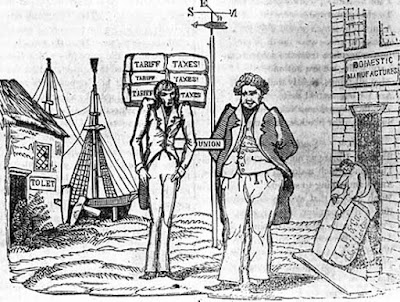The New York Report on Nullification, written by Martin Van Buren, is many things. Part political and constitutional theory, part historical review, it is also a ringing defense of Andrew Jackson as a leading proponent of states' rights and bulwark against consolidation notwithstanding some of the reasoning in his Proclamation Regarding Nullification and an exhortation to South Carolina and the other states to rise above local interests in favor of the Union.
While these strands frequently overlap, and although I may vary from this course, my intention at this point is to focus to the extent possible primarily on the more theoretical aspects of Van Buren's Report, those portions of the Report that set forth, in the Report's own words, “a frank and explicit avowal of the principles which, in their [the members of the Committee of the New York legislature that released the Report] opinion, ought to be applied to the construction of the Constitution of the United States, and to control in that respect the administration of the government established by it.”
Van Buren began his substantive discussion with the observation that the process of creating the Constitution represented a clash between competing fears of “anarchy” and “consolidation.” Those who feared anarchy “believed, that unless great vigor was imparted to the Federal arm, it would not be able to sustain itself against the power and influence of the States, and effect the great objects which all desired to accomplish, through the agency of the Federal Government.” Their opponents, who “supposed, that the natural tendency of the new system would be towards consolidation,” argued that “the powers delegated to the government, thus created, [should therefore be] granted with a sparing hand, scrupulously and vigilantly guarded, and the remaining powers and sovereignty of the States amply protected.”
Experience has proved, Van Buren maintained, that the tendency toward consolidation is the bigger problem:
Time, and the course of events, have solved the great problem that divided the [Constitutional] Convention. It is now apparent that the tendency of the system is to encroachments by the Federal Government upon the reserved rights of the States, rather than to an unwillingness on the part of the States to submit to a full exercise of the powers which were intended to be delegated to the General Government.
Fortunately, the Convention wisely foresaw this result and produced a Constitution that delegated only a few, specifically defined powers to the federal government and reserved “the great mass of the business of the people” to the States:
The Committee are advocates for the reserved rights of the States, and a strict construction of the Constitution of the United States. Experience has, they think, fully demonstrated the wisdom of the determination of the Convention to commit to the Federal Government, the management of such concerns only, as appertain to the relations of the States with each other, and with foreign nations, and certain other matters particularly enumerated in the Constitution: leaving the great mass of the business of the people, relating as it does mainly to their domestic concerns, to the legislation of the States.
This tendency toward consolidation, Van Buren argued, has to a great extent driven the political history of the country since 1789, as the people have periodically reacted against the tendency by “ris[ing] in their strength, and driv[ing] from power, the agents employed in giving it effect.” The first such rising was “the memorable civil revolution of 1800;” the second was the election of Andrew Jackson in 1828.
The anarchy and centrifugal tendencies feared by advocates of consolidation, in contrast, have not come to pass and have not been a factor in the history of the country. “[N]ot an instance has occurred in which the resistance of a single State, to the measures of the Federal Government, has excited sufficient sympathy or countenance from her sister States, to afford cause for a well grounded apprehension of detriment to the Union, by an improper combination amongst its members.” Even now, “at this critical emergency in our public affairs,” other States are “throwing their great moral and physical weight into the scale of the Union.”
Against this historical backdrop, Van Buren then turned to the core issue of secession, which he phrased as “the claim which is advanced, that a single State has a right to withdraw herself, against the wishes of her co-States, from the Union, whenever, in her sole judgment, the acts of the Federal Government shall be such as to justify the step.” And so, too, I will turn to Van Buren's discussion of that issue in my next post on the topic.
The image at the top is a “[c]artoon drawn during the nullification controversy showing the manufacturing North getting fat at Southern expense.”







No comments:
Post a Comment